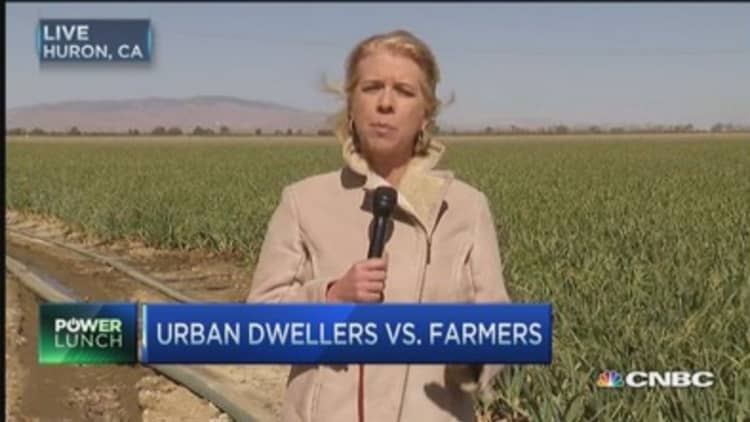
If you tuned in to talk radio in Los Angeles last week, you might have heard some screaming.
"The farming industry is using 80 percent of the water, and they're 2 percent of the economy, justify that!" shouted John Kobylt of KFI radio's "John and Ken Show."
Kobylt was ripping into Brad Gleason, who manages almond and pistachio operations in California. When Gleason argued that the actual water usage was lower, and that nuts use less water than other California commodities like dairy cattle, Kobylt wasn't having any of it.
Read MoreHow to fix California's drought problem
"You're full for crap," he told the farmer.
California has the most people and the biggest farm economy, but an epic drought is turning the two against each other.
Craig Underwood's family has been farming in California for decades. He's survived pests, floods, and (so far) drought. Nothing, however, has prepared him for the PR onslaught farmers now face as California runs dry.
"We're producing food and fiber which is vital to our existence," Underwood said, standing in a lemon grove. "Currently crops are doing better, farms are doing better, and all of a sudden we're being criticized for doing better."
Farmers are being criticized for using too much water and not sacrificing enough in the state's four-year drought. As Gov. Jerry Brown ordered city residents and businesses to slash water usage by 25 percent, reports have surfaced that 80 percent of the state's water goes to agriculture, where the governor is not ordering cuts.
Read MoreCalifornia's four-year drought starts a 'water truck' boom
Farmers say the real percentage is closer to 40 percent, but that is still four times as much as the water going to city homes and businesses. The idea of slashing minutes off morning showers and ripping out lawns at the expense of growing nuts exported to Asia has some city dwellers gushing with resentment.
"They're growing almonds, which takes 10 percent of the water supply in a desert climate. How nuts is that?" Kobylt asked during a break at the KFI studios. (Disclosure: This reporter occasionally fills in on KFI.)
Co-host Ken Chiampou believes that asking cuts from city residences and businesses, who use only 10 percent of the state's water, is penalizing the wrong group. "I need to eat," he said, "but I don't need to eat pistachios."
The two are among the most vocal critics in the growing backlash against farmers. Almond ranchers in particular have been questioned for their water use, as it takes about a gallon of water to produce one nut. Of the state's $6 billion almond production last year, 70 percent was exported.
It's kind of ironic that now that we are actually growing crops that are in great demand, we are being criticized that we are growing crops that are being exported. It's a little frustrating.Mark Borbafarmer, California Central Valley
"Everybody could use fewer of every crop I'm sure, but almonds are in such demand not only in the U.S. but around the world," said Mark Borba, who farms 9,000 acres in the Central Valley, including almonds. He said there's no better climate anywhere for growing the nuts ("bees don't pollinate where it's cold and wet") and his drip irrigation is extremely efficient.
"It's kind of ironic that now that we are actually growing crops that are in great demand, we are being criticized that we are growing crops that are being exported," he said in one of his orchards. "It's a little frustrating."
Read More
Farmers point to the water sacrifices they've been making for years, and the hundreds of thousands of acres they've stopped planting. "We are getting zero surface water allocations from our (federal) contracts," said Borba, meaning he has to rely on groundwater, and there are concerns that even that water is being dangerously depleted.
The threat of less water and higher prices now has some farmers taking aim at each other. The Associated Press reports that authorities are investigating the disappearance of water from the Sacramento Delta after complaints from water agencies representing some farmers in the Central Valley. The main culprits could be farmers closer to the source who tell the AP they aren't breaking any rules because they have senior water rights in a system that goes back a century.
Every day the public is learning more about the byzantine system of water regulations and rights in the Golden State. The Los Angeles Times reports that for years, California has been overpromising the amount of water it can deliver.
Meanwhile, homeowners in San Juan Capistrano have gone to court claiming that a tiered rate system, which charges higher rates for people who use more water, violates state law.
And agriculture isn't the only sector getting new scrutiny. For all the water that goes to farming, even more goes to environmental purposes. "I don't hear criticism of water that's being used to bring back fish, which is a good goal, but is it effective?" asked farmer Underwood. "We're providing food with very few people and tremendous resources, and it takes water to grow food."
Borba believes if the situation really becomes dire, farmland groundwater will be pumped and diverted to the aqueduct to send to cities. "Ultimately," he said, "people will always have the first call on water."
Kobylt and Chiampou would prefer that sooner rather than later.
"We can do without the almonds, I can't do without a glass of water," said Kobylt. "So we win, they lose."


